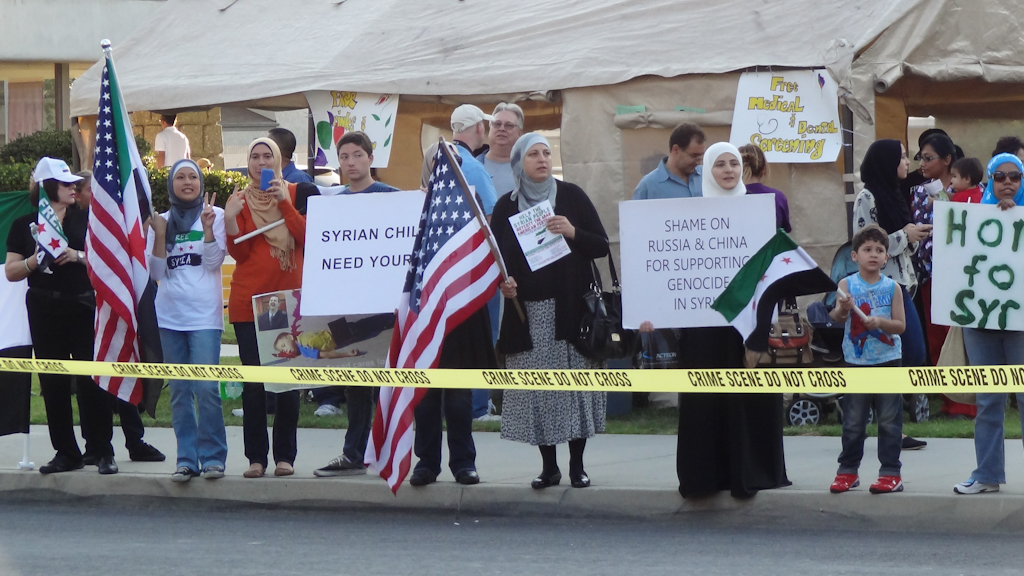
Arab-Americans of all ages protest the Assad regime and the violence taking place in Syria at the Arab-American Festival Saturday, Sept. 29 in Garden Grove. | Julia Henning/THE CHIMES
Religious leaders, political representatives and throngs of offended citizens around the world have spoken out against an anti-Muslim film clip titled “Innocence of Muslims” that went viral on YouTube.
The satirical film is considered blasphemous by Muslim believers and is a grave insult to Islam. Devotion to the Prophet Muhammad is at the very core of Islamic faith. In addition to affirming their devotion to Allah and his prophet through each of their five daily prayers, Muslim believers adhere to the Sunnah, which describes the way Muhammad lived his life.
“The Sunnah is following the example of Muhammad, who is the perfect example [to Muslims],” according to Moussa Bongoyok, a Biola intercultural studies professor. “Anything he said, anything he condoned, anything he encouraged, any lifestyle he adopted must be followed as the perfect example. So if you attack Muhammad, you are attacking the heart of Islam.”
The film depicts the prophet and his followers as violent and abusive men. Muhammad’s sexuality is depicted in several ways.
“In one scene the Prophet Muhammad sanctions the sexual abuse of children; in another, he says he is gay,” BBC News reported.
Nakoula Basseley Nakoula, a 55-year-old Egyptian-American Coptic Christian who resides in Cerritos, is credited with producing the film. The BBC News reports that a 14-minute clip of the film was first posted on YouTube in July. The film, which was shot in Los Angeles County, gained widespread international attention around Sept. 11, 2012. In the days that followed, protesters took to the streets throughout the Muslim world, including in Pakistan, Afghanistan, Lebanon, Yemen, Egypt, Indonesia, Azerbaijan and the Philippines.
While the film has become the subject of global dialogue, the practical implications of its message are most explicitly expressed in the reactions of the individuals it has personally affected. The vast Arab population of Southern California provides a local context in which the international response to the film can be grounded, according to Victor Khalil, an Arabic professor at Biola.
Adding further damange to Islam's reputation
The nature of the film is an attack on a deeply personal facet of a Muslim’s faith, according to Faysal Burhan of the Institute of Arabic and Islamic Studies in Palmdale. Burhan compared the depth of the offense in the eyes of a Muslim to someone taking a knife and cutting their child or loved one.
“I do not approve of any violent reaction as a result, but that’s how deep it affects us,” he said. “He’s beyond our parents, he’s beyond our kids in love. That’s how deeply we adore the Prophet.”
Palestinian Muslim Shadi Odeh asserts that Nakoula attempted to dramatize a “sore spot” in Muslim culture and further damage Islam’s often misunderstood reputation. While he denounced Nakoula’s “propaganda,” Odeh recognizes that the responsibility of accurately portraying Islam rests primarily upon Muslim believers.
“The greatest representation of a faith is the individuals who carry the faith,” he said. “So the shortcoming, I believe, really comes from the genuinity of Muslims.”
While local Muslim and Coptic leaders have condemned recent violent protests, the global media landscape has consistently reflected enraged responses to the video.
Video could be motivated by frustration
Heidi Saad, a Coptic Christian residing in Southern California, suggested that one motivation behind the making of the film could be frustration over the persistent persecution of Christians throughout the Middle East, particularly in Egypt. Religiously motivated church and business burnings, business robberies and killings have long afflicted the Christian population of Egypt, according to Saad.
Saad recognized, however, that such a motivation does not justify the message portrayed in the film. When she first viewed the film, she questioned whether it was a serious undertaking of a Coptic believer.
“When I watched it, I didn’t like the language at all,” she said. “It’s not the language we use as Copts. I’ve never heard Coptic people talking or thinking this way.”
Both the film’s production and the angered response witnessed throughout the Middle East illustrates a pressing need for Muslims and Christians to understand their common humanity in the eyes of God, according to Saad.
“We are all equal in God’s eyes,” she said. “He created Muslims, he created Christians. He’s the one who created everyone equal.”







